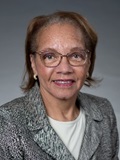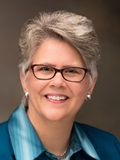Improving Communication and Care of Patients with Autism in Healthcare Settings
January 24, 2024
2:00 PM - 3:00 PM (ET)
Hosted by the Faculty Leadership Network
Webinar Details
Autism diagnosis rates and associated co-morbidities continue to rise. Yet, many who work in the healthcare field have limited understanding of the autism spectrum and how autism manifests. Hear from experts who will provide the latest evidence and information on supportive interventions to better care for both the patients and families living with autism.
Objectives:
- Learn to recognize autism characteristics and the common challenges associated with autism in the healthcare setting
- Increase understanding of how to effectively manage environments of patients and families living with autism and identify strategies to reduce risk of behavioral challenges.
- Gain knowledge to enhance communication about autism to improve outcomes for patients and families.
- Expand awareness of healthcare avoidance by patients and families living with autism.
Note: Recording of the webinar will be available soon after the webinar airs. Visit AACN's On-Demand Webinars to watch.
Speakers
Speakers

Sharon L. Colley, PhD, DNP, RN, ACAC, CNE
Professor
Ferris State University School of Nursing
Dr. Sharon Colley has been a nurse for 34 years, working for many years in mental health as well as med-surg, rehab, and ambulatory care prior to moving into a faculty position in 2006. She earned a PhD in higher ed leadership and a DNP in nursing leadership. Dr. Colley has a passion for education and preparing nurses to be educators. She has earned certification as a nurse educator, as an advanced autism specialist, and as a neurodiversity professional. She has also earned several awards for her teaching, including the Ferris State University Distinguished Teacher Award in 2016.
Sharon’s interest in providing information sessions for healthcare professionals stems in part from her own experiences as the parent of a child with autism as well as her DNP project work that focused on improving healthcare environments for those with autism.
Tags
Nurse Leaders’ Experiences Managing the Clinical Environment During COVID-19
December 14, 2023
2:00 PM - 3:00 PM (ET)
Hosted by the Faculty Leadership Network
Webinar Details
COVID-19 tested the competency of nurse leaders to manage in an environment of crisis, ambiguity, and chaos. This study uncovers nurse leaders’ perspectives on sources of distress, coping mechanisms, significant challenges, and how specific demographics impact resilience, agility, and emotional regulation. This study offers opportunities to enhance middle manager preparation and reimagine equitable and inclusive programs for diverse leaders.
Objectives:
- Identify the leadership competencies perceived by nurse leaders as most challenging during ongoing crisis.
- Outline the demographic characteristics associated with the perception of challenging leadership competencies as it relates to resilience, agility, and emotional regulation.
- Discover equitable and inclusive best practices for competency preparation and ongoing development for nurse leaders.
Note: Recording of the webinar will be available soon after the webinar airs. Visit AACN's On-Demand Webinars to watch.
Speakers
Speakers

Chika Anueyiagu, DNP, RN, NE-BC
Director of Surgical Services
Yale New Haven Hospital
Dr. Chika Anueyiagu is the Director of Surgical Services at Yale New Haven Hospital with oversight of Inpatient surgical units including, surgical intensive care, trauma, intermediate care, bariatric, general surgery, vascular, and minimally invasive surgery units. She has leadership experience spanning over 20 years in several roles across specialties and settings. In these roles, she had the responsibility of alignment and executing strategic initiatives while ensuring excellent outcomes in nurse-sensitive indicators. Chika earned her Doctor of Nursing Practice Degree from Fairfield University in Executive Leadership. She obtained her Nurse Executive Board certification through the American Nurses Credentialing Center.

Patricia Span, PhD, RN, CPHQ, CENP
Strategy & Learning Specialist
Yale New Haven Hospital
Dr. Patricia Span is the Strategy & Learning Specialist at Yale New Haven Hospital Patient Services Administration with primary responsibility for development and oversight of the nursing strategic business plan and nursing communications comprised of the annual report and nursing news. She has extensive experience as a nurse leader in Education, Professional Practice, Quality, Nursing Research as well as organizational customer service strategies. Patricia received her Doctor of Philosophy in Nursing and is Board Certified in Executive Nursing Practice from the Association of Nurse Executives and credentialed in health care quality from the National Association of Health Care Quality.
Tags
Implementing a Substance Use Course into RN-BS Curriculum
November 14, 2023
2:00 PM - 3:00 PM (ET)
Hosted by the Faculty Leadership Network
Webinar Details
This presentation provides an overview of integrating substance use content into an RN-BS curriculum. Substance use in the United States increased dramatically during the COVID-19 pandemic and is already alarmingly high, 13% of Americans reported beginning or increasing use of substances during this time to cope with pandemic associated stressors. Additionally, opioid deaths increased by 30% during this same period of time. Nurses care for patients experiencing substance use disorder (SUD) in every healthcare setting and historically nursing curriculum has not well-prepared students for caring for this vulnerable population. With the increase in substance use, nurses must be equipped with the knowledge to provide care for this vulnerable population.
Objectives:
-
Discuss the need for substance use education in nursing curricula.
-
Describe the integration and success of a substance use course into RN-BS curriculum.
-
Identify opportunities and resources for incorporating SUD into nursing education.
-
Share strategies on how SUD resources can be used to prepare students to address SUD in practice.
-
Share anonymous student feedback about the value of the course.
Note: Recording of the webinar will be available soon after the webinar airs. Visit AACN's On-Demand Webinars to watch.
Speakers
Speakers

Darci McCall, PhD, RNC-OB, C-EFM
Clinical Associate Professor
Boise State University School of Nursing
Dr. Darci McCall has been a nurse for 13 years, working primarily in the maternal-child setting. She earned her BSN from Idaho State University, her MSN from Jacksonville University, and her PhD in Nursing Education from the University of Northern Colorado. She discovered her passion for nursing education when she became a clinical instructor working with students in OB, NICU, and pediatrics. She was hooked and in 2015, she moved into a full-time faculty role at Boise State University. Having taught in a variety of settings at Boise State, she currently teaches in the RN-BS completion track program, where she is the lead faculty for several courses. Dr. McCall is passionate about nursing education and helping students learn and apply new information in every setting.
Dr. McCall’s research interests focus on substance use, specifically marijuana, during pregnancy and the stigma surrounding its use. Her interest in substance use disorder stems from her work in different hospital systems providing care to patients experiencing addiction and substance use disorder during pregnancy and as a faculty member working with students who care for this vulnerable population.
Dr. McCall has earned certifications in Inpatient Obstetric Nursing, Electronic Fetal Monitoring and is a Fetal Heart Monitoring Instructor. She is a member of the NCC’s Inpatient Obstetric Content Team, Inpatient Obstetric Item Writing Team, and the Inpatient Obstetrics Standard Setting Committee. She strongly advocates for SUD recognition, treatment, recovery, and educating nurses to care for this population compassionately and effectively.
Tags
Integrating Population Health Competencies into Practice, Academia, and the Nursing Workforce
October 26, 2023
2:00 PM - 3:00 PM (ET)
Hosted by the Faculty Leadership Network
Webinar Details
Learn more about population health initiatives deployed across the state of Connecticut from 2021-2023 in the areas of practice, academia, and the nursing workforce. Discover programs and strategies that can help to accelerate local efforts to meet population health needs.
Objectives:
- Identify statewide initiatives launched by the Connecticut Center for Nursing Workforce to support population health competencies.
- Explain the components of population health education at a nursing residency program at a Connecticut hospital.
- Summarize the impact of the population health course at a state college in Connecticut.
- Describe how the AACN Population Health Domain is integrated across initiatives.
Note: Recording of the webinar will be available soon after the webinar airs. Visit AACN's On-Demand Webinars to watch.
Speakers
Speakers

Marcia B. Proto, MEd, CAS
Executive Director
Connecticut Center for Nursing Workforce, Inc.
Marcia Proto enjoys a successful career in state and national association leadership, nursing education and workforce development, healthcare fundraising, and statewide coalition building. She is currently Executive Director for the Connecticut Center for Nursing Workforce (CCNW) as well as the owner of Marcia Proto Consulting, LLC.
Her life’s work has involved connecting people through education and targeted skills training toward fulfilling career paths, particularly in the nursing field. In addition to her roles with the CCNW, she has held management positions at the Connecticut Hospital Association, Junior Achievement of South-East Connecticut, Flath & Associates Consulting, and the National League for Nursing.
Marcia has spent the past 25 years ensuring that the nursing workforce will meet the nation’s growing healthcare needs by contributing to and engaging in state and national workforce development activities, including the Center to Champion Nursing in America, a national initiative funded by the Robert Wood Johnson Foundation in collaboration with AARP.

Catherine E. Johnson, PhD, RN, CNE, APHN-BC, RA, CPH
Assistant Professor in Nursing
Pacific College of Health and Sciences
Catherine (Kate) E. Johnson has been a registered nurse for 35 years and was the public health nurse in her community for 13 years (2008-2021). Dr. Johnson has taught Community/Population Health for over 8 years in traditional undergraduate and RN to BSN programs. She is certified in Advanced Public Health Nursing by the ANCC and in Public Health by the National Board of Health Examiners in 2022. In 2021, Dr. Johnson was a member of the Education and Professional Development Committee for the Association of Public Health Nurses, which focused on developing the Public Health Policy Cycle content for the New to Public Health (N2PH) Residency Program. She previously served on the Massachusetts Local Public Health Advisory Committee.
Dr. Johnson graduated from Keuka College in New York with a BSN, earned an MBA from Western New England College in Massachusetts, an MSN from American International College in Massachusetts, and a PhD in nursing education from Capella University in Minnesota.
Tags
Reviewing for Professional Journals: Strategies for Success
October 19, 2023
2:00 PM - 3:00 PM (ET)
Webinar Details
Reviewers serve an essential role in promoting the quality of manuscripts that are published in professional journals. In this webinar, you will learn how to become a manuscript reviewer and how to write a quality review. A step-by-step process for completing excellent reviews will be highlighted.
Objectives:
- Explain the purpose of manuscript reviews.
- Describe steps for becoming a manuscript reviewer and how to respond to a review invitation.
- Examine the process and criteria to use when evaluating manuscripts and making recommendations.
Note: Recording of the webinar will be available soon after the webinar airs. Visit AACN's On-Demand Webinars to watch.
Speakers
Speakers

Patricia Morton, PhD, RN, ACNP-BC, FAAN
Editor of the Journal of Professional Nursing
Dean Emeritus
University of Utah
Patricia G. Morton is Dean Emeritus, University of Utah College of Nursing. Dr. Morton has authored three textbooks, numerous book chapters, and over 60 journal articles. She has served on the editorial board of six nursing journals and for seven years was the editor of a clinical journal sponsored by the American Association of Critical-Care Nurses. Currently, Dr. Morton is the editor of AACN’s Journal of Professional Nursing. She is a certified acute care nurse practitioner. Dr. Morton was inducted as a fellow in the American Academy of Nursing in 1999.